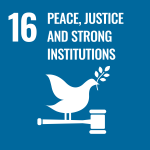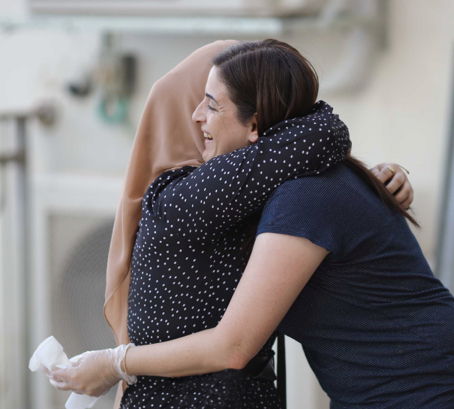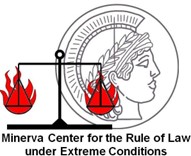 Goal 16: Peace, Justice and Strong Institutions
Goal 16: Peace, Justice and Strong Institutions
PROMOTE PEACEFUL AND INCLUSIVE SOCIETIES FOR SUSTAINABLE DEVELOPMENT, PROVIDE ACCESS TO JUSTICE FOR ALL AND BUILD EFFECTIVE, ACCOUNTABLE AND INCLUSIVE INSTITUTIONS AT ALL LEVELS
Research
The effects of virtual cooperative video games have not yet been explored within the setting of hostile intergroup contexts; nor have they been tested among school-aged children. Through Gaming for Peace, Faculty of Education’s Dr. Joy Bentov et al. share their longitudinal school- based intervention that enabled virtual contact between Jewish- Israeli and Palestinian-Israeli children.
When Victimhood Goes to War? Israel and Victim Claims, is the first systematic study demonstrating that victim narratives can pose challenges for governance. In the article, Dr. Keren Sharvit of the Herta and Paul Amir Faculty of Social Sciences, and her colleague from University of Kent, Tadek Markiewicz, examine under what conditions Israel’s political elites incorporate victim narratives towards armed conflicts.

The Minerva Center for the Rule of Law under Extreme Conditions initiates innovative interdisciplinary research on the normative and institutional dimensions of the rule of law under extreme conditions, as well as in-depth examination of law- in-action. It fosters multifaceted empirical and theoretical research in the study of rule of law as a social sphere during belligerents, natural disasters and socio- economic acute crises.
Public Engagement
Members of the Peace and Conflict Management Program at University of Haifa are part of the founding team of the consortium of Universities and civil society organizations working toward shared society in 6 countries in hopes to overcome identity-based divisions and inter-group conflicts, share knowledge and conduct innovative research.
The National Security Studies Center (NSSC) studies security on national, regional, and global levels, and the interrelationships between powers on each level. Moreover, the NSSC focuses on the Israel-Palestine conflict, the fundamental political issues and key conflicts of the middle east and the different alliances in the region.
Learning & Students
Since the founding of the UofH, the Jewish-Arab Center (JAC) has worked to promote good relations between Jews and Arabs within Israel and to enhance peace between Israel and the Palestinians. One of the primary focuses of the center concerns campus life, initiating common activity, seminars and various projects between Jewish and Arab students.
 The MA Program in Peace and Conflict Management is a rigorous, one-year program of study that introduces an interdisciplinary approach to peace and conflict. The curriculum addresses intergroup conflicts
The MA Program in Peace and Conflict Management is a rigorous, one-year program of study that introduces an interdisciplinary approach to peace and conflict. The curriculum addresses intergroup conflicts  at different levels, ranging from the local to the international arena, and explores a variety of approaches to dealing with conflicts in different parts of the world with special attention on the Middle East.
at different levels, ranging from the local to the international arena, and explores a variety of approaches to dealing with conflicts in different parts of the world with special attention on the Middle East.
Operations
The city of Haifa is widely recognized as a model of co- existence between Christians, Muslim, Druze and Jews. Haifa is the pre-eminent example of what are known in Israel as ‘mixed cities.’ In the Haifa Laboratory for Religious Studies a community of researchers, visiting professors and students collaborate on scholarly research about religions – with a particular focus on interfaith dialogue and interdisciplinary collaboration.
 On-campus public activity on the part of the members of the University community complements the University’s academics. The University views it as an obligation to allow the members of its community to fully express opinions, outlooks, and beliefs, and to maintain a dialogue about them. Public activity is defined as any political, social, cultural, entertainment, or academic (other than teaching) activity. This includes rallies, protests, lectures, distributing flyers, putting up booths, showing movies, and any other public activity (including enclosed spaces).
On-campus public activity on the part of the members of the University community complements the University’s academics. The University views it as an obligation to allow the members of its community to fully express opinions, outlooks, and beliefs, and to maintain a dialogue about them. Public activity is defined as any political, social, cultural, entertainment, or academic (other than teaching) activity. This includes rallies, protests, lectures, distributing flyers, putting up booths, showing movies, and any other public activity (including enclosed spaces).

